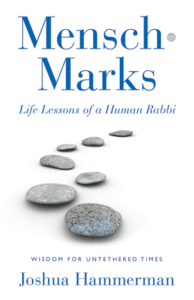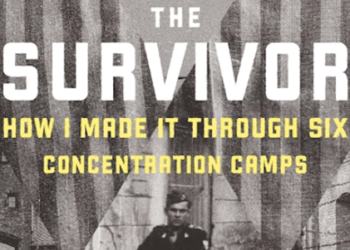Reviewed by NEAL GENDLER
Joshua Hammerman wants to amplify the importance of being a mensch in a world with a surplus of discord.
The flat-rocks illustration on the cover of Mensch Marks shows the idea behind the 42 essays inside: stepping stones to menschlichkeit, which for those bereft of Yiddish or German could be rendered as “menschiness.”
“One isn’t born a mensch, nor is it a status that one ever completely achieves; for to boast that you are a mensch is, by definition, not to possess the requisite humility to be one,” says Hammerman, rabbi of Conservative, egalitarian Temple Beth El, Stamford, Conn.

“In a world as dehumanizing as ours has become, simply being a kind, honest and loving person, a man or woman of integrity, has become a measure of heroism,” he says.
The word “love” recurs throughout, and pieces have titles such as “Rising Above the Hate,” “Shedding the Baggage,” “Fathers and Sons,” “The Invisible Fence,” “Numb and Numb-er” and “My Brother’s Keeper,” in which he discusses having a disabled brother, implicitly urging us to see the person inside the disabled.
“Hugging, Blessing, Letting Go” points out how parental pride in children becoming adults is coupled with diminishing ability to protect them. The Bar Mitzva of his son Dan was emotionally difficult. “Only part of me survived this ordeal,” he says, “the part that has learned how to hug with one arm and let go with the other.”
There’s a lovely essay on appreciating the beauty of nature and the limits of our human power.
Most of the 42 steps expand on behaviors taught by good parents, but Hammerman — 2008 winner of the Rockower Award for excellence in Jewish journalism and the 2018 Religion News Association award for commentary — is a clever writer with some humanizing self-deprecation and delightful turns of phrase.
In “Shedding the Baggage,” he tells of going to an outlet mall “to buy the exact same khaki pants I purchased a few years before — only one size larger.” Hating waste, he keeps the old pants, “just in case,” but adds: “The Messiah will undoubtedly come before I again fit into them.”
Hammerman avoids self-congratulation despite a close brush in his introduction: “I’ve devoted my life to trying to become a more fully realized, morally evolved human being, a person of character.
“Jews have a word for that: mensch. … For Jews, there is no greater honor than for another person to call you one.”
There’s little here with which to disagree; everyone can benefit from more menschlichkeit, both as givers and receivers. But I don’t understand why he thinks American Jews should vote in Israeli elections. Citizens vote.
Particularly welcome is Hammerman’s admonition that “Jewish ritual is vacuous if it does not lead to ethical ends.”
“Superrabbi, the flawed model” is subtitled: “Taking myself off the pedestal.” In a time of “widespread sexual, financial and power abuses by clergy, it never has been more important to stop deifying them,” he says. His model for himself is “as a co-traveler, a very well-educated member of the flock,” sharing his experiences and learning from theirs.
His longest piece tells how an essay speculating on the disorderly result of the 2011 Super Bowl victory led by the hugely admired Tim Tebow brought national notoriety, with accusations of insulting evangelicals. Included is his 2012 Yom Kippur sermon about his error, how everyone makes errors or feels failure, and how even God forgives.
Forty of Hammerman’s mensch marks appeared earlier, mostly in New York’s big newspaper The Jewish Week. For some, he has written introductions or added material. He explains the title’s dot, which appears throughout.
A.A. Milne quotes are sprinkled in “to act as a unifying thread, a reminder that boring can be beautiful.”
His publisher doesn’t expect a bored reception: A first printing of 15,000 is much greater than for most nonfiction books.
In one place, Hammerman criticizes a modern biblical translation for taking away its flavor, but I think he does the same by using a de-gendered version of the Hillel quote: “In a place where there are no men, strive to be a man.”
“In a world that lacks humanity, be a human” is close, but not quite the same. Even Hammerman, hospitalized with kidney stones, tells himself: “Man up!” Good or bad, people are humans. Hillel is describing behavior — menschlichkeit equally available to women, who perhaps more often are its practitioners.
***
Neal Gendler is a Minneapolis writer and editor.
(American Jewish World, April 2019)





















